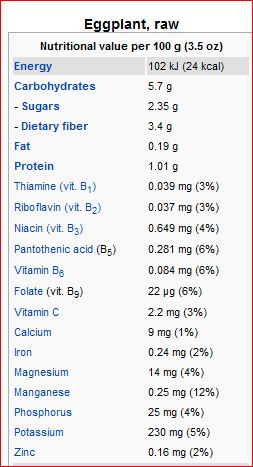The aubergine, eggplant, brinjal eggplant, melongene, brinjal or guinea squash (Solanum melongena) is a plant of the family Solanaceae (also known as the nightshades) and genus Solanum. It bears a fruit of the same name, commonly used in cooking. As a nightshade, it is closely related to the tomato and potato. It is domesticated in India from Solanum incanum.
It is a delicate perennial often cultivated as an annual. It grows 40 to 150 cm (16 to 57 in) tall, with large coarsely lobed leaves that are 10 to 20 cm (4–8 in) long and 5 to 10 cm (2–4 in) broad. Semiwild types can grow much larger, to 225 cm (7 ft) with large leaves over 30 cm (12 in) long and 15 cm (6 in) broad. The stem is often spiny. The flowers are white to purple, with a five-lobed corolla and yellow stamens. The fruit is fleshy, has a meaty texture, and is less than 3 cm (1.2 in) in diameter on wild plants, but much larger in cultivated forms.
The fruit is botanically classified as a berry and contains numerous small, soft seeds which are edible, but have a bitter taste because they contain nicotinoid alkaloids; this is unsurprising as it is a close relative of tobacco.
Health Properties
A 1998 study at the Institute of Biology of São Paulo State University, Brazil, found eggplant juice to significantly reduce weight, plasma cholesterol levels, and aortic cholesterol content in hypercholesterolemic rabbits.
The results of a 2000 study on humans suggested that 'S. melongena infusion had a modest and transitory effect, no different from diet and exercise.
A 2004 study on humans at the Heart Institute of the University of São Paulo found no effects at all and did not recommend eggplant as an alternative to statins.
The nicotine content of aubergines, though low in absolute terms, is higher than any other edible plant, with a concentration of 0.01 mg per 100g. The amount of nicotine consumed by eating eggplant or any other food is negligible compared to being in the presence of a smoker. On average, 9 kg (20 lbs) of eggplant contains about the same amount of nicotine as a cigarette.
Allergies
Case reports of itchy skin or mouth, mild headache, and stomach upset after handling or eating eggplant have been reported anecdotally and published in medical journals (see also oral allergy syndrome). A 2008 study of a sample of 741 people in India, where eggplant is commonly consumed, found that nearly 10% reported some allergic symptoms after consuming eggplant, while 1.4% showed symptoms within less than 2 hours. Contact dermatitis from eggplant leaves and allergy to eggplant flower pollen have also been reported. Individuals who are atopic (genetically predisposed to developing certain allergic hypersensitivity reactions) are more likely to have a reaction to eggplant, which may be because eggplant is high in histamines. A few proteins and at least one secondary metabolite have been identified as potential allergens. Cooking eggplant thoroughly seems to preclude reactions in some individuals, but at least one of the allergenic proteins survives the cooking process.
.jpg)

No comments:
Post a Comment